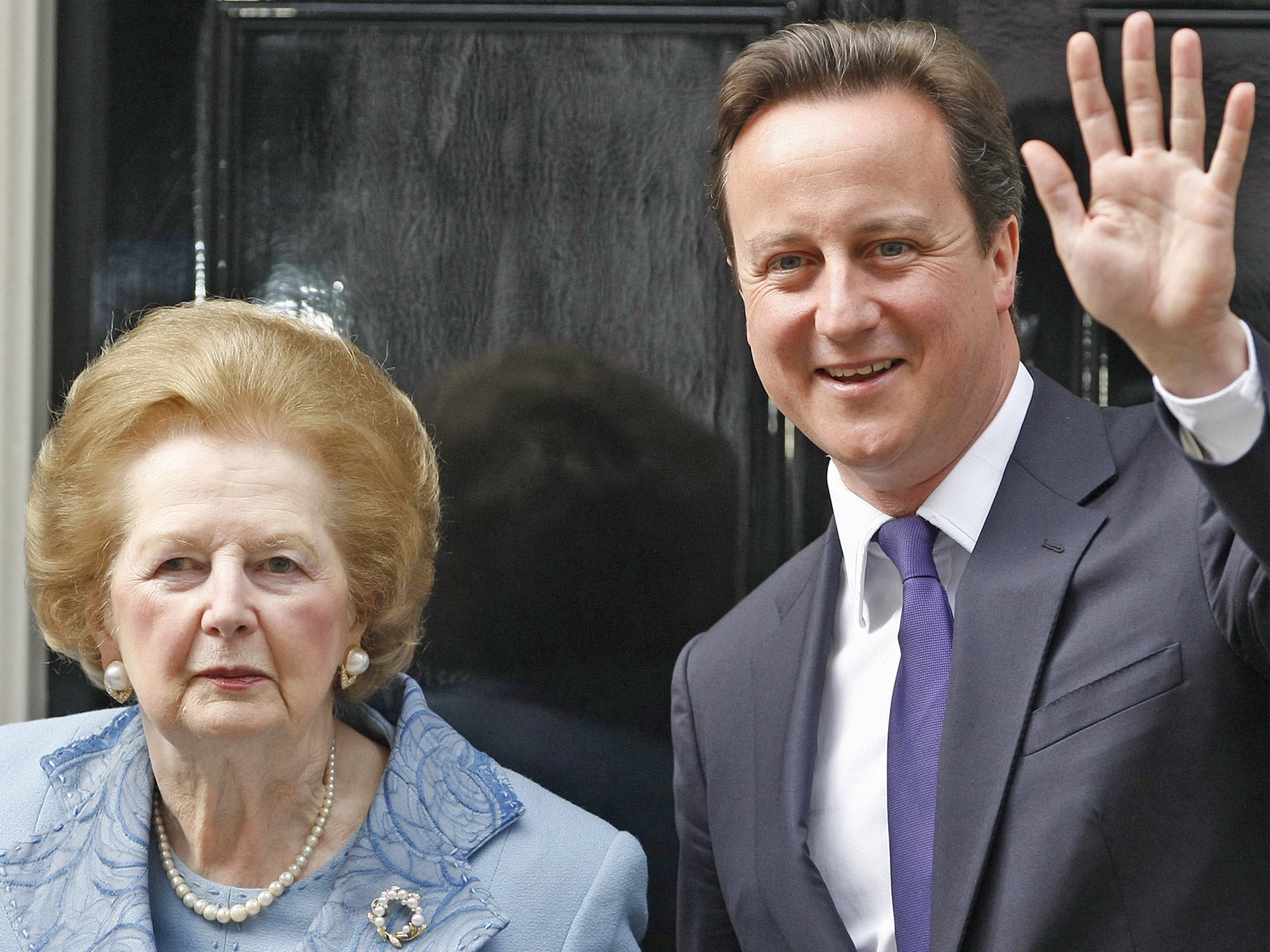The ghost of Margaret Thatcher will haunt David Cameron until he shows he can win an election
The unusually large band of 148 new Tory MPs elected in 2010 are very much 'Thatcher’s children'


Your support helps us to tell the story
From reproductive rights to climate change to Big Tech, The Independent is on the ground when the story is developing. Whether it's investigating the financials of Elon Musk's pro-Trump PAC or producing our latest documentary, 'The A Word', which shines a light on the American women fighting for reproductive rights, we know how important it is to parse out the facts from the messaging.
At such a critical moment in US history, we need reporters on the ground. Your donation allows us to keep sending journalists to speak to both sides of the story.
The Independent is trusted by Americans across the entire political spectrum. And unlike many other quality news outlets, we choose not to lock Americans out of our reporting and analysis with paywalls. We believe quality journalism should be available to everyone, paid for by those who can afford it.
Your support makes all the difference.When Margaret Thatcher began writing her memoirs after being booted out of office by her party rather than the voters, her original title was “Undefeated" before she opted for a more prosaic The Downing Street Years.
It would have been so much better for her successors as Conservative Party leader if she had been defeated by the electorate. Her bitterness at being pushed out by her own Cabinet in 1990 was understandable. The act of matricide left deep scars that have still not healed today.
The manner of her departure gave her some legitimacy in seeking to influence events under her successor Sir John Major. He proved a disappointment to her, especially when Europe rose to the top of the agenda. Lady Thatcher’s acolytes made his life a misery by dripping poison, briefing against him and using his shrinking Commons majority to hold him to ransom. She wasn’t pulling all the strings. But she didn’t need to.
After choosing three Eurosceptic leaders, it took a third election defeat in 2005 before the Conservatives finally took a different track, opting for the moderniser David Cameron. Although Lady Thatcher’s portrait still hung in many local Conservative associations around the country, the only Tory photograph in Mr Cameron’s office as Opposition Leader was one of Harold Macmillan, the One Nation Tory Prime Minister.
Mr Cameron deliberately distanced himself from Lady Thatcher, much to the irritation of her followers. For many non-Tory voters, she personified the “nasty party” he promised to detoxify. He saw himself as the “heir to Blair”. While she said “there is no such thing as society”, he argued: “There is such a thing as society, it’s just not the same thing as the state.” His plan to complement the Thatcher economic revolution with a social one was overtaken by the 2008 financial crisis – and his “big society” mantra bombed at the 2010 election.
The resulting Coalition gave Mr Cameron a comfortable Commons majority, so he was not dependent on a hardcore of Eurosceptic trouble-makers.
Yet the Prime Minister is still stalked by the ghost of Lady Thatcher. The large band of 148 new Tory MPs elected in 2010 are very much “Thatcher’s children”, reflecting the ageing, traditionalist electorate in local parties. The MPs are an impressive, hyperactive bunch, forming influential groups such as Free Enterprise, which lobbies for tax cuts for business, and Fresh Start, which drew up a long shopping list of powers to be reclaimed from the EU.
No leader could afford to ignore half his parliamentary party and Mr Cameron has had to tack in a Thatcherite direction. Talking about the “common ground” as Prime Minister rather than the “centre ground”, where he pitched his tent in opposition, may not look very different. But the “common ground” featured in Lady Thatcher’s speeches and was coined by her intellectual guru Sir Keith Joseph, so Mr Cameron sends a big signal to his party by adopting it.
Yet that, and his promise of an in/out referendum on Europe, have not stopped Thatcherites plotting against a man they cannot forgive for not winning a majority in 2010. “We could do with another one like her right now,” announced Lord Tebbit after Lady Thatcher’s death.
Yesterday Paul Goodman, executive editor of the ConservativeHome website, said of Mr Cameron: “He is dwarfed by her giant shadow. This would be true of any imaginable Conservative leader. But it is accentuated by a single fact. She won three elections. He hasn’t – yet – won one.”
Mr Cameron may have replaced the Tories’ burning torch logo with a tree. But as those new Tory MPs line up to praise Lady Thatcher in the Commons today, he will be reminded that the Thatcherite flame will continue to burn strongly in his party.
Join our commenting forum
Join thought-provoking conversations, follow other Independent readers and see their replies
Comments